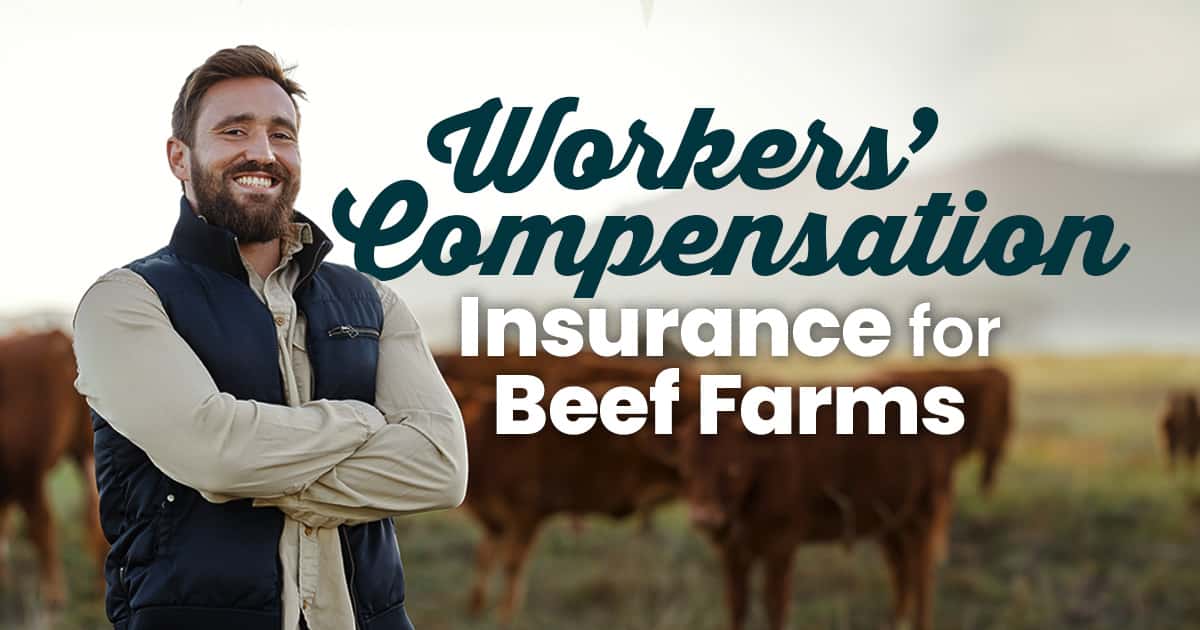
Workers’ Compensation Insurance for Beef Farms
March 30, 2024
Share:
As an employer, i.e., an owner of a beef farm in Ontario, you are legally obligated to register with WSIB Ontario and acquire some level of coverage for your employees – whether those are family members or even sub-contractors. From the 10th day after you hire your first employee, you are obligated to register your business. This regulation is put in place to protect what is easily the lifeblood of beef farms.
Running a successful beef farm involves numerous tasks and responsibilities, often requiring a dedicated workforce to ensure operations run smoothly. While the contributions of farm employees are invaluable, it’s crucial to acknowledge that agriculture can be a physically demanding industry with inherent risks. Injuries sustained by farm workers can lead to significant financial burdens for both the employee and the farm owner. That’s where workers’ compensation insurance steps in, providing essential protection for employees and their families, while safeguarding the long-term sustainability of beef farming operations.
As part of a comprehensive beef farm insurance package, workers’ compensation comes in handy to protect what is considered to be the backbone of all beef farms: its workforce. In this article, we’ll expand on the benefits of workers’ comp for beef farms, risk mitigation for beef farms, and the benefits of sufficient insurance for your farm in Ontario.
Workers’ Compensation for Employee Injuries on Beef Farms
According to a statistic from the Canadian Agricultural Safety Program, it is said that an average of 114 people are killed and near 1,500 are seriously injured working on farms each year. Farmers face higher occupational risk than most other workers, due to the nature of what they do – i.e., working with 800 to 1,000 pound animals, driving and operating heavy (and often dangerous) machines, handling hazardous materials, and working in both intense heat and cold.
As part of an existing farm insurance plan, workers’ compensation is considered a type of no-fault insurance which provides the following coverage for beef farmers:
- Protection for loss of income if workers are injured or ill, which is based on 90% of the total worker’s net earnings/average income.
- Lawsuit protection, which offers protection for both your entity/farm, your workers, and any other parties that are covered. This can cover legal expenses, like attorney fees, administrative costs, awarded settlements, and more.
- Medical/return-to-work services, so your injured or ill farm workers will have access to whatever medical services they require to be fit to work again. This may include things like counselling, physiotherapy, or even chiropractic treatments.
Since employers are required by law to have this protection for their workforce, it only makes sense – otherwise you might face severe penalties, which could greatly impact your farm’s reputation.
Risk Management for Beef Farms and Beef Farm Employees
Prioritizing risk management for beef farms and, more specifically, beef farm employees. Since your employees are so integral to your operations, having the right risk management strategy to protecting them indirectly protects the wellbeing of your operations overall.
- Establishing and enforcing safety protocols is essential to create a culture of safety on your beef farm. Develop written safety policies that cover various aspects of farm operations, including livestock handling, machinery operation, chemical usage, and handling of hazardous materials. Make sure to regularly communicate these to employees and consider even the implementation of routine safety meetings.
- Prioritize a “buddy” system. It can be extremely dangerous working alone on a farm. In fact, this is how most injuries on the farm happens. Equip beef farm employees with a partnership system, or have them work in teams. Equip employees with appropriate personal protective equipment to minimize injury risk.
- Take care of your property. Regular maintenance of farm facilities, such as fences, gates, and working areas, is crucial for ensuring a safe working environment. Conduct routine inspections of buildings, machinery, and equipment to identify and address potential hazards promptly.
- Regularly review and update your emergency response plans. Develop and regularly review emergency response plans that outline procedures for handling accidents, injuries, or emergencies on the farm. Make sure to train employees on these protocols, including evacuation procedures, first aid, and emergency contact information. To ensure everyone is cognizant of what to do in the event of an emergency, conduct drills periodically to ensure employees are familiar with the plans and can respond effectively in case of an emergency.
For further advice on risk management for your beef farms, or advice on how to save on your farm insurance coverage, contact Excalibur Insurance. Our team will be happy to discuss your farm’s needs today, or how certain coverages may be relevant to your protection plan.
The Benefits of Sufficient Farm Insurance
Adequate insurance, and sufficient risk management, are two integral crucial aspects of a long-term, prosperous beef farming operation. Beef is a crucial industry in Canada – although the vegans and vegetarians may not agree – but its farms don’t come without risks. Keeping your employees safe, both with risk management and with the right insurance, can help keep your business afloat.
Business insurance may not be the “highest priority” when it comes to your list of to-dos, but it should be up there! Insurance is crucial to safeguarding your business’ finances and giving you a fallback if all else should fail. Give us a call to discuss insuring your beef farm today.






